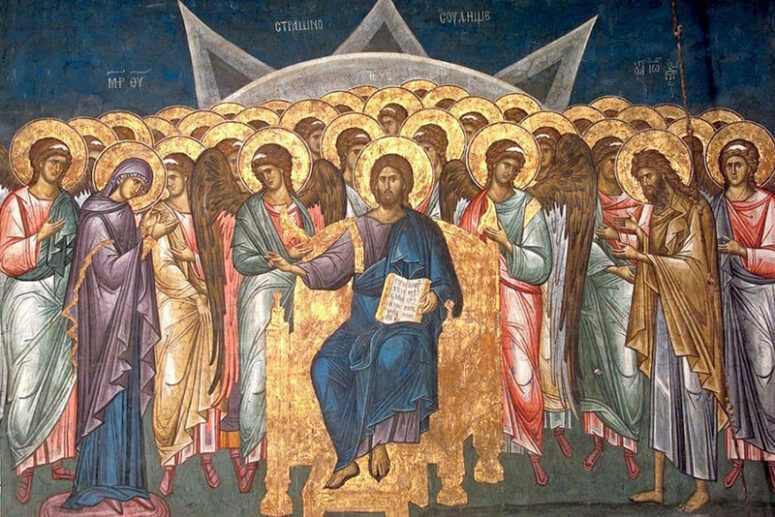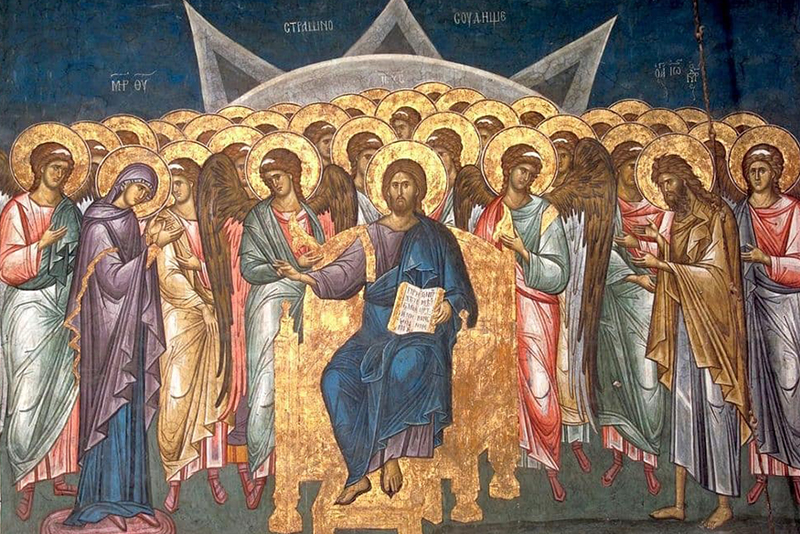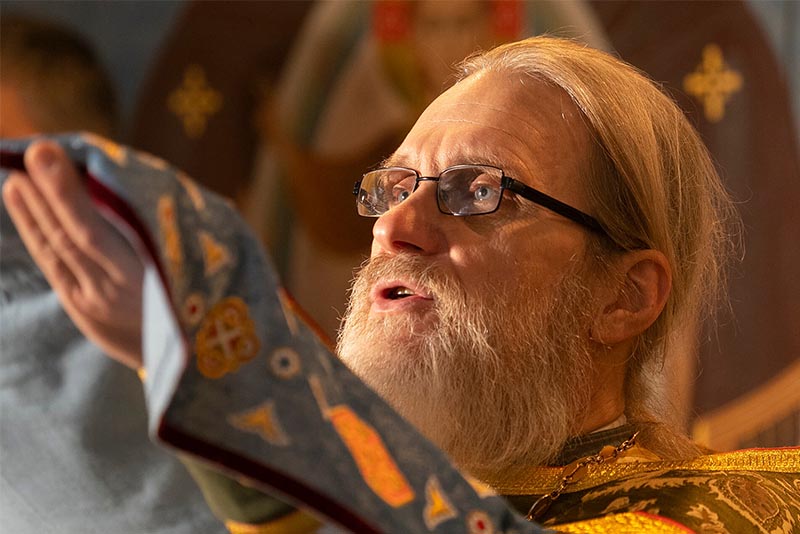
Today we continue to prepare to follow our Lord to His cross and empty tomb at Pascha. Great Lent begins a week from tomorrow, and it is time for each of us to get ready to embrace the spiritual disciplines of the season in a way appropriate to our spiritual strength and life circumstances. Since fasting from rich food and giving generously to the needy are characteristic practices of Lent, the Church directs our attention today to passages of Scripture that place them in their proper context.
When St. Paul wrote to the confused Gentile Christians of Corinth, he had to remind his audience of former idol worshipers to restrain their liberty in what they ate for the sake of their weaker brothers and sisters in Christ. Pagan temples were a good source of cheap barbeque in Corinth, and some new converts might be led back to paganism by the sight of a fellow believer eating meat that had been sacrificed to a false god. St. Paul warned that scandalizing someone in that way was a sin against the Lord and wrote that “if food is a cause of my brother’s falling, I will never eat meat, lest I cause my brother to fall.” Notice that the problem was not with the food itself, but with how eating it might harm someone else. He called the Corinthians to limit their freedom for the sake of others.
As we prepare to give up eating meat after today until Pascha, we must keep squarely in mind that there is nothing intrinsically wrong with any kind of food. The problem is not with what is on the menu, but with how we use food in ways that weaken us spiritually. Remember that, in the biblical narrative, humanity’s estrangement from God is first manifested in relation to food. Our unruly appetite is a prime example of our enslavement to our own desires, of our addiction to getting what we want when and how we want it. That is a form of idolatry as dangerous as that which threatened the faithfulness of the Corinthians. It may even be more dangerous because it is so subtle, as few people today think of their eating habits as being spiritually significant.
Especially in a society where food is plentiful and relatively cheap, it is so easy to get in the habit of eating in a self-centered, indulgent way that is not healthy spiritually or physically. The more deeply ingrained the habit of satisfying our taste buds and stomachs becomes, the weaker we become in our ability to resist other self-centered, indulgent desires. That makes it harder to put the needs of others before our own or to control what we say or do for the sake of others. We do not fast in Lent because some foods are unholy, but in order to learn to redirect our deepest desires to God. Our fulfillment is in Him, not our bellies. Since every human being bears His image and likeness, we should fast in a way that strengthens us in our ability to serve Him in our neighbors, especially those we are inclined to overlook and disregard. Not only is fasting a powerful tool for the healing of self-centered desire, it will also save us some money on our grocery bill that we can then give to the poor.
The Lord makes the connection between our spiritual health and generosity to our needy neighbors quite clear in His parable of the Last Judgement. The ultimate standard of eternal destiny here is how people treated Him in the hungry, the thirsty, the naked, the stranger, the sick, and the prisoner. Neither those on His right nor on His left had any idea of the spiritual significance of their actions, but His identification with “the least of these My brethren” is so real that whatever they did, or did not do, to the miserable people they encountered throughout their lives, they did or did not do, to Him.
Hunger, thirst, disease, crime, and all other forms of human misery as we know them in our world of corruption are symptoms of our estrangement from God. Instead of living as those made in His image and likeness, we have all followed in the way of the first Adam in prideful, self-centered indulgence. That is why we are inclined to obsess about fulfilling our own desires while ignoring the basic needs of our neighbors. The habit of stuffing ourselves with rich food weakens our ability to put others before ourselves in any area of life. If we want to become those who serve Christ “in the least of these,” we must learn that our lives—including our money, time, and energy– do not amount to a grand offering to ourselves. No, we must learn to refuse to gratify many of our inclinations so that we will be able to offer ourselves in holiness to the Lord Who is present in our suffering neighbors.
Unfortunately, we are usually so weakened by our self-centered desires that we do not treat other people with the dignity of living icons of the Savior. The problem is not that we fail to work out in our minds that Christ is present to us in a particular person, but that we lack the spiritual strength necessary to serve them as we should. This is the same kind of weakness that we experience before our favorite foods and beverages; before we know it, we have consumed too much. It is the same kind of weakness that we have when we are angry and find it virtually impossible not to lash out. It is the same kind of weakness that makes it to so easy to choose just about anything over prayer. The problem is not with our ideas about what is true, but with our souls.
Lent hits us where we live and there is much in us that does not like that. But what path other than that of self-denial will enable us to follow Christ to the cross and to embrace the joy of His resurrection as the fulfillment of our existence? If we do not learn to deny ourselves in humility as we serve our neighbors each day, then how can we truly claim to be united with Christ, Who offered Himself for the salvation of the world? If we are in Him, His sacrificial love must become characteristic of us in how we live the point that we may say with St. Paul “It is no longer I who live, but Christ Who lives in me.” (Gal. 2: 20)
Even as we fast in a way appropriate to our spiritual maturity and life circumstances, we should think of serving “the least of these” in the same way. To give up because we cannot meet our imagined ideal of perfection is simply an excuse not to pursue the healing of our souls. We can all pray for those who suffer, provide friendship and support to someone who is lonely and troubled, and treat neighbors with love. We can all become a blessing to someone who needs us. We can all restrain our self-indulgence in order to grow in generosity. Instead of doubting the significance of what we can do, we must remember that the Lord accepts even the small offerings we are able to make in humility and blesses them to serve His Kingdom abundantly.
Remember also that we will never gain the strength to serve the Lord faithfully in people who are not close to us if we have not learned how to serve Him in those who are close to us, especially our spouses, children, and family members. The opportunities for finding healing from self-centeredness are unlimited in the common life of man and woman together with their children and extended families. That is why brides and grooms are crowned for martyrdom in the Orthodox wedding ceremony. If we are not sacrificing ourselves out of love for those with whom we are “one flesh,” how will we ever be able to do that for others? Regardless of marital status, most of us do not have to look far for opportunities to serve Christ in those we know quite well.
The same is true of our life together in the Body of Christ, for we are all “one flesh” in Him. Doing what we can to bear one another’s burdens and to provide relief of whatever kind for the problems that we face is how we serve the Lord together. For all our challenges, this little parish has embodied His love in powerful ways both for our members and complete strangers. If we serve Christ faithfully in His Body the Church even in what seem like the small ways that are available to us, we will advance in dying to our illusions of self-centered individuality and embrace more fully our true identity as members of Him and one another.
Let us fast this Lent in ways that will free us from bondage to the self-centeredness that causes so much human misery and keeps us from serving our Savior in “the least of these.” Let us serve one another in the life of this parish and in our families in ways that prepare us to enter a Kingdom in which “the last shall be first, and the first last.” (Mark 20:16) Let us never forget that what we do, or do not do, to the people we are inclined to ignore, we do to the Lord Himself. Let us repent by gaining the spiritual strength to reorient our lives to serving Christ in all those who bear His image and likeness. That is how we, by God’s grace, may have good hope of entering into the Kingdom of Heaven.




